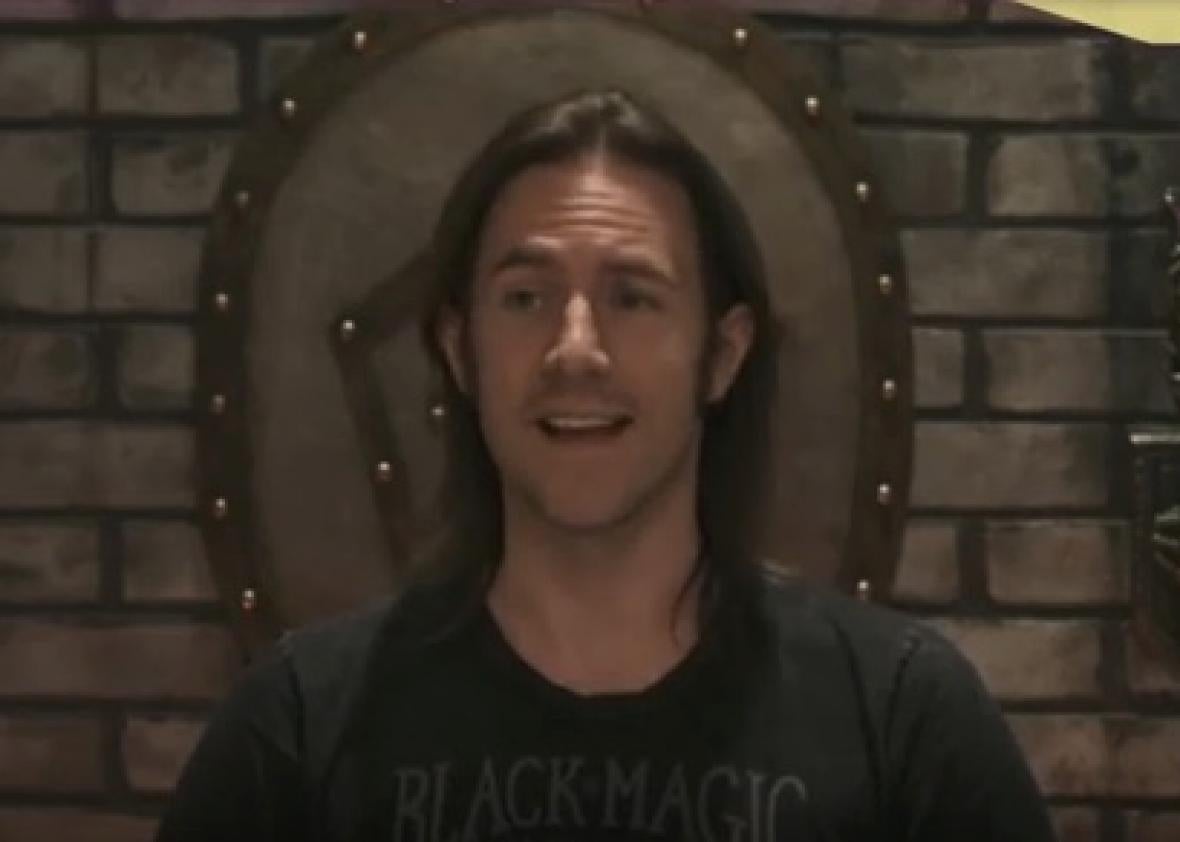Dungeons & Dragons has become a spectator sport. Players are broadcasting D&D sessions on live video streaming sites like Twitch; there are podcasts of D&D campaigns; Wizards of the Coast—the company that makes D&D—even posts regular videos on YouTube. But this past year, a new show, Critical Role, which airs live every Thursday on the Twitch stream Geek & Sundry, has elevated this old-school game into something else entirely: compelling television, even for those who wouldn’t know a vorpal sword from a Volkswagen.
For the uninitiated, D&D is a role-playing game in which the players make up characters and participate in a story narrated by another player dubbed the Dungeon Master. The Dungeon Master also serves as a sort of referee, using the rules to determine whether or not a player is successful in whatever he or she is trying to accomplish, from swinging a sword to singing a song. Imagine a combination of improv theater, storytelling, and a strategy board game.
Critical Role is basically just a live-streamed game of D&D, except the players are all accomplished voice actors. Over the past year, the show has developed an active following, especially on Twitter. (Devotees call themselves “Critters.”) The show’s first episode currently has more than 800,000 views on YouTube.
In Critical Role, the adventures of the players, collectively known as Vox Machina, have taken them throughout a vast fictional world. They’ve battled dragons, sealed an evil artifact within an ancient vault, and sparked a rebellion in a town ruled by vampires. But from the beginning, one thing has elevated Critical Role above your average D&D session: the acting. The performers on Critical Role rarely slip out of character, even when they’re just rolling the dice. And they provide their own running commentary, too—during their moments out-of-character, the players make jokes about the rules, the story, and themselves. Unlike a standard D&D game, they aren’t just performing for each other; they’re winkingly performing for us. You could say they’re doing DVD extras for the game as they’re playing it.
The show has a large cast: Ashley Johnson (the most recognizable actor to an average viewer, currently starring on the NBC show Blindspot) as the cleric Pike; Laura Bailey and Liam O’Brien believably spar as the siblings Vex and Vax; Sam Riegel brings puckish humor to Scanlan the bard; Marisha Ray bestows druid Keyleth with the gravity to be the party’s moral compass; Tallesin Jaffe wrestles with his demons (both literal and figurative) as Percy; and Travis Willingham gleefully embodies the dim-witted barbarian Grog. (Orion Acaba, who formerly brought winning bluster to the sorcerer Tiberius, left the show to work on other projects.)
Much of the credit for Critical Role belongs to the show’s Dungeon Master, Matthew Mercer. In addition to creating and narrating the show’s story, he voices all of the non-player characters, transforming himself into different men and women, allies and villains, shopkeepers and monsters. To get a sense of the scale of Mercer’s task: Imagine if Dick Wolf had written and directed every episode of Law & Order, in addition to guest starring as every witness, defendant, defense attorney, and judge. Yet Mercer makes it look easy. He slips in and out of characters as if strolling through a revolving door.
As each episode progresses, the actors triangulate as they improvise: They advance the story, develop their characters, and stake out their own little spot in the world. In one episode, Grog—not the cleverest member of the party—is trading for a potion, and the merchant wants two vials of dragon’s blood in return. Willingham pauses for a brief moment, then tells the merchant: “How about … three vials of dragon’s blood?” His fellow actors groan, then break down into laughter.
Sure, it’s corny, but the actors sell their performances so well that you really begin to invest in their emotional arcs. Vax has developed over the course of the show from brigand to unlikely hero. He has also fallen in love with Keyleth, who isn’t quite sure how to respond to his affections. These character arcs run seamlessly alongside the players’ encounters with goblins, demons, and gelatinous cubes. Willingham, O’Brien, Ray, and their co-stars have somehow made a tabletop game entertaining to people who aren’t even playing it.
In fact, the show’s strengths have little to do with D&D—the game is merely the scaffolding that holds the narrative together. The reason people are invested in Critical Role isn’t the dice rolling or spellcasting; it’s the same reason people were invested in the schoolteacher-turned-drug-kingpin Walter White or the charming-but-damaged adman Don Draper. The members of Vox Machina aren’t quite antiheroes, but they’re not perfect either. They make mistakes; they snipe at each other; they act selfishly. And that humanity makes them compelling to watch (though if I’m going to be nerdy about it, most of the characters technically aren’t human).
And the world these characters live in is immersive. It may not tip into Game of Thrones territory yet, but it’s getting there, in its own way. Minor characters return to play key roles. Enemies become allies. Decisions from long ago turn out to have grave consequences. In the most recent episodes, a surprise attack leaves much of the characters’ home city in ruins. In the midst of the chaos, they search the streets, desperately looking for beloved friends and allies. And in those moments, I forgot that I was watching D&D—I only saw the anguish on the faces of each of the actors as everything their characters had come to love came crashing down around them. I wondered how they could possibly deal with so much death and destruction. Then they were attacked by ruffians, and the dice got rolling again. And that was fun, too.
